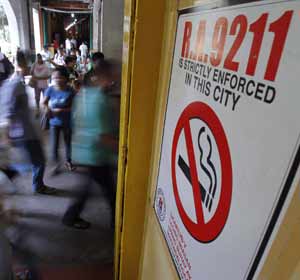 A smoking ban poster is seen displayed near city hall in Manila May 30. Bishop Jose Oliveros of Malolos, chairman of the Philippine bishops’ Office on Bio-Ethics, and Bishop Honesto Ongtioco of Cubao, said the smoking ban in public places should be implemented nationwide. (CNS photo/Romeo Ranoco, Reuters)MANILA, Philippines –– Two bishops joined the anti-tobacco campaign in the Philippine capital, saying the smoking ban in public places should be implemented nationwide.
A smoking ban poster is seen displayed near city hall in Manila May 30. Bishop Jose Oliveros of Malolos, chairman of the Philippine bishops’ Office on Bio-Ethics, and Bishop Honesto Ongtioco of Cubao, said the smoking ban in public places should be implemented nationwide. (CNS photo/Romeo Ranoco, Reuters)MANILA, Philippines –– Two bishops joined the anti-tobacco campaign in the Philippine capital, saying the smoking ban in public places should be implemented nationwide.
In separate interviews on Church-run Radio Veritas, Bishop Jose Oliveros of Malolos, chairman of the Philippine bishops’ Office on Bio-Ethics, and Bishop Honesto Ongtioco of Cubao said smoking is harmful to smokers and non-smokers alike, reported the Asian church news service UCA News.
The Metro Manila Development Authority started a drive May 30 to enforce a smoking ban in public places. People caught smoking in public areas initially were only given warnings.
“This is just the information campaign period. Next month, we will start imposing penalties,” said Francis Tolentino, development authority chairman.
The ban, however, can be enforced only in areas where local councils have ordinances that penalize smoking in public places. Sixteen of the 17 local councils in metropolitan Manila have such ordinances.
Public places where smoking is banned include government buildings, churches, schools, hospitals, public utility vehicles, terminals, bars and restaurants.
“I am in favor of the smoking ban because we have to protect the health of the public,” said Bishop Oliveros in his interview.
In a separate interview, Bishop Ongtioco said he was concerned about secondhand smoke and its effect on children.
“It is not healthy,” he said. “People get cancer even if they are not smokers because they get it from the environment.”
The two bishops also suggested additional taxes on “sin products” such as cigarettes and alcoholic beverages as a way to discourage consumption.
“That way, the government will also earn more revenues. We help the individual, and the government also benefits,” Bishop Oliveros said.
“I see the wisdom in prohibiting smoking in public places, which we should have done before. Labels such as ‘Smoking is dangerous to your health’ help. In Malaysia, the warning label on the cigarette packet is very graphic and scary. This is required by the law of Malaysia. If Malaysia can do that, why can’t we do that here?” he said.
